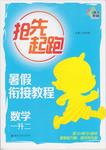题目内容
7.Cutting trees in half can help scientists understand the past and now it appears it can be used to predict the future.Researchers have been looking at ring growth from trees to make sense of past weather patterns such as droughts and rain.Combining data from the rings allowed them to create a copy of pictures of climate changes over the past 2,000 years and this information could also be used to foresee future famine(饥荒),unrest and conflict.The project has been named Old World Drought Atlas,or OWDA.
Its main author,Columbia biologist Edward Cook,has already carried out similar projects using trees to create chronological(按顺序排列的) maps of drought in Asia and North-America.He believes that combining the three atlases could throw light on the global causes of drought and climate change.
The study,for instance,gave special attention to the importance of one of such causes,the North Atlantic Oscillation(涛动),in affecting climate patterns in Europe,and specifically in making Europe wetter north of the Alps and drier south of them.
The OWDA also helped analyse historical events from a climatic perspective.For instance,the 1740-174l famine in Ireland had so far been explained by an unusually cold winter and spring,but the atlas shows that unusually low rainfall over the spring and summer of 1741 could also have played a role.Finally this made growing food nearly impossible and caused a continent-wide famine.
A better grasp of these processes could even make it possible to predict future famine,unrest and conflict.
Cook said,64The Old World Drought Atlas fills a major geographic gap in the data that's important to determine patterns of climate changes in time.That's important for understanding causes of many droughts,and it's important for climate modelers to test hypotheses(偎说) of climate forcing and change.
32.Why is ring growth useful in research?B
A.It's the best way to understand the past.
B.It could be used to predict the future.
C.It could be used to prevent the outbreak of droughts and rain.
D.It isn't mentioned in the passage.
33.People worldwide can read chronological maps of droughtA.
A.in Asia
B.in Africa
C.in Europe
D.in South America
34.What is the author's attitude toward the study of OWDA?C
A.Positive.
B.Negative.
C.Objective.
D.Conservative.
35.Why did the author of the passage mention what Cook said?B
A.To show he interviewed Cook himself.
B.To tell us the importance of OWDA.
C.To compare climate variability.
D.To analyse how to predict droughts.
分析 本文主要讲述科学家经过研究得出结论,树龄有助于预知将来的天气变化.
解答 32--35 BACB
32.B.细节理解题.根据第一段now it appears it can be used to predict the future可知,利用年轮的增加来预测未来.故选B.
33.A.细节理解题.根据第三段中Columbia biologist Edward Cook,has already carried out similar projects using trees to create chronological maps of drought in Asia and North America可知,世人可以读到有关亚洲的干旱图.故选A.
34.C.推理判断题.文章中,作者对此的态度并非特别明确(因为作者没在文章中有暗示自己的观点或相关的词等),文章就是从客观的角度来描述.故选C.
35.B.推理判断题.根据最后一段中的几个部分很重要,如The Old World Drought Atlas fills a major geographic gap和That's important for understanding causes of many droughts,and it's important for climate modelers.由此可判断"其目的是说明古老地图册的重要性".故选B.
点评 高考中选用的科技文往往反映的是当今人类最先进的科技水平和最新的科研成果.我们阅读它的过程其实就是学习科学知识,掌握科技信息的过程.然后,理解文章,分析文章,以阅读材料所提供的科学事实为依据,同时得出的结论还应符合基本的科普常识,对照时要特别注意范围大小、程度高低、数量多少、条件与结果、方法与目的、成就与问题、可能性与现实性.在细心对照基础上,经过一番分析、综合,然后就要根据题目要求对选项作出正确判断了,这些判断包括选项的表达是否符合原文的意思,对概念,文句的理解是否正确,对要点归纳是否全面等,从而排除错误选项,选择最合适的答案.

 数学奥赛暑假天天练南京大学出版社系列答案
数学奥赛暑假天天练南京大学出版社系列答案 南大教辅抢先起跑暑假衔接教程南京大学出版社系列答案
南大教辅抢先起跑暑假衔接教程南京大学出版社系列答案Tom had (49)Da stroke(中风)the year before.Now Cara wondered if he had (50)B again.She grabbed her grandfather's head,pulled his face out of the water and then pulled him up onto the solid ground.The winter sun almost disappeared,and they were both shaking from the (51)A.Cara knew she would have to get Tom to (52)Cfirst,a quarter mile away.But sixty feet from the car,Tom fell.From there,he crawled (爬),(53)D himself under a gate,to the car.Caro helped him into the passengers'side and then got into the driver's seat."I used to sit on my dad's lap and watch him (54)A,"said Cara.Although she felt (55)B,she pushed (56)Bhe gas and drove toward the nearest hospital where her grandmother Esca was to meet (57)A.
Tom spent six days (58)Ain the hospital from a stroke.Since the accident,he has (59)D going to the pond alone."If Cara hadn't helped,she might not have a grandpa (60)B,"said Esca.
| 41.A.Even | B.Still | C.Thus | D.But |
| 42.A.should | B.could | C.might | D.would |
| 43.A.because | B.though | C.as | D.since |
| 44.A.turned over | B.turned back | C.turned up | D.turned out |
| 45.A.Once in a while | B.As a result | C.By all means | D.All of a sudden |
| 46.A.fell | B.jumped | C.rolled | D.dived |
| 47.A.bottom | B.bank | C.water | D.pond |
| 48.A.waited | B.cared | C.reached | D.looked |
| 49.A.felt | B.seen | C.stood | D.suffered |
| 50.A.that | B.one | C.everything | D.something |
| 51.A.coldness | B.tiredness | C.anxiety | D.hunger |
| 52.A.the farm | B.the gate | C.the car | D.the house |
| 53.A.devoting | B.rushing | C.carrying | D.dragging |
| 54.A.drive | B.sing | C.dance | D.play |
| 55.A.relaxed | B.nervous | C.satisfied | D.embarrassed |
| 56.A.in | B.on | C.away | D.off |
| 57.A.them | B.her | C.him | D.they |
| 58.A.recovering | B.treating | C.struggling | D.experiencing |
| 59.A.continued | B.agreed | C.managed | D.stopped |
| 60.A.after all | B.any more | C.at least | D.any better |
| A. | within | B. | beyond | C. | beneath | D. | against |